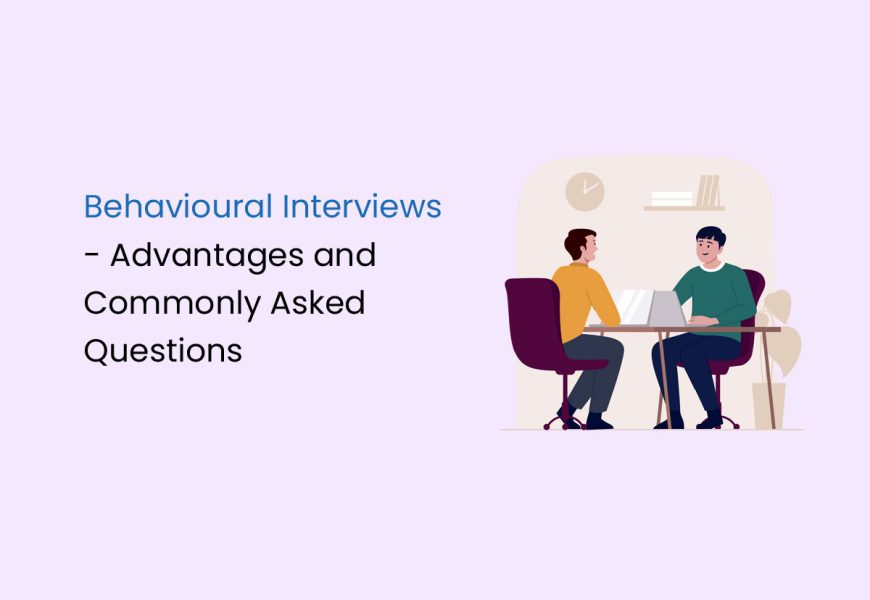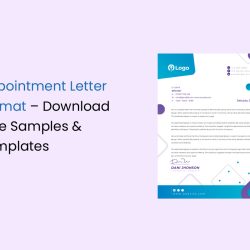Behavioural interviews have become a standard part of the hiring process for many companies, and for good reason. Unlike traditional interviews, focusing solely on qualifications and skills, behavioural interviews delve deeper into a candidate’s past experiences and behaviours to predict future performance.
Let’s look further into behavioural interviews–their definition, advantages and the most commonly asked behavioural questions.
What are Behavioural Interviews?
Behavioural interviewing is a method to evaluate a candidate’s ability to do a job by looking at their previous experiences. This method is based on the idea that past performance best predicts future success. Employers use this method to understand how candidates have used their skills in the past to predict their future job performance if hired. During a behavioural interview, candidates are asked to share stories that showcase their skills in essential job functions. This helps employers get insights into their potential success in the role.
Why are Behavioural Interviews used?
Behavioural interviews are used for the following reasons:
- Predictive Validity: Research suggests that past behaviour strongly indicates future behaviour. By asking about specific examples from your past experiences, employers can better predict how you might perform in similar situations.
- Objective Evaluation: Behavioral interviews provide a structured framework for evaluating candidates. Employers can make more objective comparisons and assessments by asking all candidates the same behavioural questions.
- Skill Assessment: Behavioral interviews allow employers to assess specific skills and competencies required for the job. Instead of relying solely on qualifications listed on your resume, employers can gain insight into how you apply these skills in real-world situations.
Advantages of Behavioural Interviews
The advantages of behavioural interviews are as follows:
- Real-World Examples: Behavioural interview questions prompt candidates to provide real-world examples from their previous job experiences. These examples offer concrete evidence of the candidate’s skills and abilities in action rather than relying on hypothetical scenarios. By hearing specific instances of how candidates have handled challenges or achieved successes, hiring managers can better gauge their potential fit for the role.
- Reduced Vagueness in Responses: Vagueness in candidate responses is a common challenge recruiters face during interviews. Behavioural interviewing mitigates this issue by prompting candidates to provide specific examples of past behaviours, leaving little room for ambiguity or vague responses.
- Mitigation of Bias: Another significant benefit of behavioural interviewing is its role in reducing bias from interviewers. Behavioural interviews minimise the risk of unconscious bias influencing hiring decisions by focusing on objective criteria—such as past behaviours and actions—rather than subjective impressions.
- Enhanced Perception of Fairness: The structured nature of behavioural interviews contributes to an increased perception of fairness among job candidates. When candidates are asked consistent questions and evaluated based on predefined criteria, they are more likely to perceive the interview process as fair and transparent.
- Authentic Assessment: Unlike traditional interviews that may elicit rehearsed or canned responses, behavioural interviewing focuses on past behaviour, providing a more accurate assessment of the candidate. Interviewers can evaluate their actions, decision-making processes, and problem-solving abilities in real-time by asking candidates to recall and describe specific situations they have encountered. This approach reduces the likelihood of candidates providing scripted answers and allows for a more genuine evaluation of their capabilities.
- Comprehensive Insight: Behavior-based interview questions enable hiring managers to gather extensive insights into candidates’ skills, competencies, and suitability. By exploring various aspects of the candidate’s past experiences, interviewers can assess their ability to handle different challenges, work effectively in teams, demonstrate leadership qualities, and adapt to changing circumstances. This approach provides a well-rounded view of the candidate’s capabilities and potential organisational contributions.
- Informed Decision-Making: Behavioral interviewing empowers hiring managers to make informed decisions about whether a candidate should move forward in the hiring process. By evaluating the candidate’s responses to behaviour-based questions, interviewers can assess their alignment with the job requirements, organisational values, and cultural fit. This helps to ensure that candidates who progress to the next stage of the hiring process are genuinely qualified and well-suited for the role.
Behavioural Interviews vs Traditional Interviews
Behavioural interview questions focus on past experiences, while traditional questions gather general background information. Behavioural interviews are more objective as they require concrete examples of handling challenging situations, while traditional interviews allow creative expression.
Tips for Conducting a Behavioral Interview
Some tips to conduct behavioural interviews are as follows:
Use the STAR Method
The STAR technique is a widely recognised and effective method utilised in behavioural interviewing. It encourages candidates to provide structured and detailed responses by guiding them through four key components:
- Situation: Describe the context.
- Task: Explain the specific task or challenge you faced.
- Action: Detail the steps you took to address the problem.
- Result: Share the outcome of your actions and any lessons learned.
Create a Scorecard
Hiring managers face the challenge of reducing bias and comparing candidates objectively. To address this, create a scorecard to rate answers on a scale of one to five. Higher scores show strong evidence of skill. This ensures fair and informed hiring decisions and streamlines the process.
Standardise the Process
Review the questions and scorecard with your team beforehand to ensure effective interviews. This will help you approach interviews consistently and interpret answers fairly. Clarify any doubts and align expectations to select the best candidate.
How to Conduct a Behavioural Interview
You can conduct a behavioural interview by following these steps:
Step 1: Draft Questions to Evaluate Essential Skills and Qualities
When drafting questions for a behavioural interview, it’s crucial to identify the specific skills and qualities essential for the role. You should meet everyone involved in the interview to agree on the most critical skills and qualities. Once you’ve prioritised them, structure questions demonstrating an individual’s ability to reach goals and excel in the position based on their experience.
Step 2: Use the STAR Approach
The STAR approach is a popular way of developing behavioural interview questions. With this approach, the candidate is asked to describe a specific situation, the tasks involved, the actions taken, and the results of the action. By using the STAR approach, you can structure questions in a way that encourages the candidate to:
- S: Describe a situation where they exhibited a specific behaviour.
- T: Explain the specific tasks involved in addressing the situation.
- A: Describe the specific actions taken to complete the required tasks.
- R: Describe the results of the actions taken.
Step 3: Create a Rating Scale
Create a standardised rating scale with clear outlines to evaluate each candidate equally. Use the same criteria and assign point values for each response to quantify your ratings. Sample rating scale:
- Far Exceeds Requirements: Perfect competency demonstrated independently.
- Exceeds Requirements: Competency demonstrated with minimal guidance.
- Meets Requirements: Competency demonstrated on familiar procedures with supervisor guidance for new skills.
- Below Requirements: Inconsistent competency even with guidance.
- Significant Gap: Fails to demonstrate competency even with guidance.
Step 4: Ask Follow-Up Questions
When you ask follow-up questions, it encourages the candidate to provide more details about the information they previously shared. If their response doesn’t provide enough insight, you can use these types of follow-up questions:
- How did you accomplish that?
- What did you do with the information?
- Could you explain further how that happened?
Commonly Asked Behavioural Questions
The most widely asked questions are as follows:
Ability to Work Under Pressure
- Give me an example of a situation where you were required to work under pressure. How did you respond?
- Describe when you were given a job or assignment in which you had no prior training. How did you learn to do it?
Attention to Detail
- Can you explain how you ensure the accuracy of your work?
- Can you describe a time when you made a mistake? What led to the error, and how did you handle the situation afterwards?
- Can you recall when a co-worker made a mistake, and you discovered it? How did you approach the situation?
Communication
- Tell me when you needed to convey an important message through verbal communication. How did you manage to do this effectively?
- Have you ever had to express your thoughts or feelings to colleagues? What was the outcome?
Conflict Management
- Please explain how you usually handle conflicts. Provide an example.
- Tell me about when you had to resolve a conflict or dispute among staff members.
Creativity
- Tell me about when a manager asked you to devise a creative way to complete a project. What steps did you take?
- Talk about a time when you presented an innovative idea to your co-workers.
Decision-Making
- Have you ever had to refrain from deciding because you need more information? What happened, and what did you learn?
- Can you describe a time when you had to make a decision with limited information? How did you approach the situation?
- Tell me about a time when you made a decision that affected your colleagues. How did you handle it?
- Can you describe a decision you made in the last year that you are proud of?
Flexibility
- Can you share an experience when you went through significant changes? How did you manage through it?
- Could you describe your experience transitioning between different roles or positions?
- Can you tell me about a time when you faced a situation beyond your control? How did you manage it?
Goals
- Please clarify how you usually go about setting your personal goals.
- Tell me about a career goal you set and whether you achieved it. What challenges did you face?
- Can you describe a time when you set a goal but couldn’t achieve it? What prevented you from reaching it, and how did you feel?
Initiative
- Tell me about when you went above and beyond to complete a task. How did you handle the situation?
- Have you ever faced a challenging assignment with limited resources? What actions did you take, and what was the outcome?
- Can you recall an instance where you identified a problem at work and devised a solution for it?
- Have you ever successfully implemented a project?
Integrity
- Talk about a time when it was challenging, to be honest. How did you handle it?
- Was there ever a time when you weren’t honest at work? What happened?
- Tell me about when you discovered a co-worker was doing something wrong. What did you do?
Interpersonal Skills
- Can you describe a situation where you had to work with a team that struggled to work together? How did you handle it?
- Can you explain how you dealt with a challenging team member while working together?
- Tell me about the worst customer or co-worker you have encountered. How did you deal with them?
Leadership
- Tell me about a time when you led a project. How did it go, and what would you do differently?
- Have you ever struggled to get others to accept your ideas? If so, what approach did you take, and was it successful?
- Describe when you had to change your leadership style to achieve the desired impact.
- Management
- How many people have you supervised? What three things would they say about your managerial style if we talked to them?
- Describe a situation where a team member was not performing up to expectations. How did you handle it?
Problem-Solving
- Provide an example of how you collected information to solve a problem. How did you analyse the data and make a decision?
- Please share an instance where you uniquely solved a problem. What was the situation, and how did you tackle it?
Teamwork
- What strategies have successfully turned a group of individuals into a cohesive team? What are some examples of strategies that didn’t work?
- Can you describe a situation where you had to work with someone with a different approach than yours? How did you manage to complete the task?
Time Management
- How do you schedule your workload and prioritise tasks?
- How did you handle the workload when you had multiple projects simultaneously?
- Was there ever a time when you fell behind on a project? What did you do?
Preparing for Behavioral Interviews
Here are some steps you can take to prepare effectively:
- Research the Company: Understand its values, culture, and the specific competencies they prioritise in their hiring process.
- Review the Job Description: Identify the key competencies and skills required for the role. Consider examples from your past experiences that demonstrate those qualities.
- Reflect on Past Experiences: Recall specific situations where you demonstrated key competencies such as leadership, teamwork, problem-solving, and adaptability.
- Practice Answering Common Questions: Familiarise yourself with typical behavioural interview questions and practice formulating concise and compelling answers using the STAR method.
- Seek Feedback: Practice your responses with a friend, mentor, or career coach and solicit feedback on your communication style, clarity, and content.
Frequently Asked Questions about Behavioural Interviews
What is the behavioural interview model?
The hiring process is often based on the belief that past experiences offer a more reliable insight into future behaviour than hypothetical scenarios. Instead of asking how a person would handle certain situations, employers are more interested in knowing how they have handled them in the past. It's essential to provide specific examples when answering these types of questions.
How do you prepare for a behavioural interview?
Read the job description carefully and make a list of the top skills required. Recall a story demonstrating your ability for each skill using the STAR technique. Practice saying your stories out loud, keeping your answers to 1.5-2 minutes. Be concise and confident while sharing your stories.
What is the meaning of Behaviour in an interview?
Behavioural-based interviewing evaluates a candidate's past experiences, behaviours, skills, and abilities by asking for specific examples of demonstrated capabilities. It predicts future behaviour and performance based on past experiences.
What type of questions are asked during a behavioural interview?
During a behavioural interview, you will be presented with a scenario and asked to describe how you have handled similar situations. The scenarios might include challenging projects, conflicts with colleagues, or managing multiple projects simultaneously.
What are employers looking for in a behavioural interview?
During job interviews, your answers to behavioural questions give employers a clear idea about your skills and work behaviour. This helps them to determine how you will perform in the role and whether you are the right candidate for the job. Employers usually look for candidates who can demonstrate the necessary skills required for the role and answer questions concisely.














